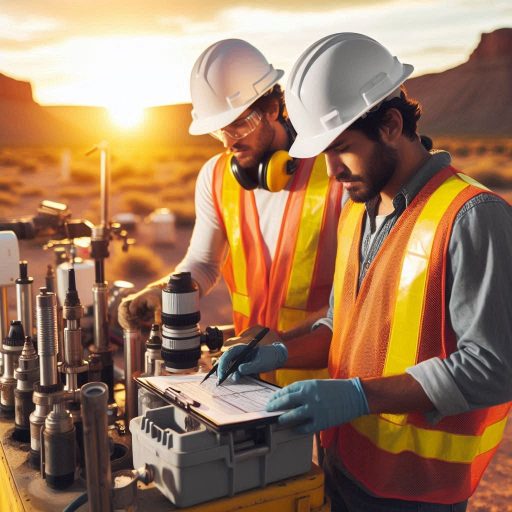Introduction
Continuing education is crucial for geological and petroleum technicians.
The industry constantly evolves, with new technologies and methods emerging regularly.
Staying updated ensures technicians remain valuable assets to their employers and maintain their expertise.
In this field, knowledge is power.
Technicians who commit to lifelong learning can adapt to changes more effectively.
They become more proficient in using advanced tools and technologies, which enhances their job performance.
Additionally, keeping up with industry trends allows technicians to anticipate shifts in the market, providing a competitive edge.
The petroleum and geological sectors are driven by innovation.
New drilling techniques, exploration methods, and data analysis tools are continuously developed.
Technicians who engage in continuing education are better equipped to integrate these advancements into their daily work.
This not only improves their efficiency but also contributes to the overall success of their projects.
Moreover, continuing education fosters professional growth.
Technicians who pursue additional training and certifications often qualify for more advanced roles.
This opens up opportunities for career progression and potentially higher salaries.
Employers value technicians who demonstrate a commitment to self-improvement, viewing them as motivated and forward-thinking professionals.
The rapid pace of change in geological and petroleum industries makes staying updated a necessity, not a luxury.
Without ongoing education, technicians risk falling behind, which can negatively impact their careers.
By investing time in learning, they ensure they remain relevant and capable in a competitive field.
Job Description
Conduct geological and geophysical studies
Geological and petroleum technicians play a crucial role in the oil and gas industry.
They are responsible for conducting geological and geophysical studies to assess the potential for oil and gas extraction.
This involves traveling to various locations to collect rock samples and analyze them to determine the composition and structure of the earth’s crust.
Collect and analyze rock samples
In addition to fieldwork, technicians also spend time in the office analyzing data, preparing reports, and collaborating with other professionals.
They use computer software and specialized tools to process and interpret geological data, such as seismic surveys and well logs.
Technicians may also assist in the development of maps and models to visualize subsurface structures.
Assist in the exploration and extraction of oil and gas
One of the key responsibilities of a geological and petroleum technician is to assist in the exploration and extraction of oil and gas reserves.
This includes working closely with geologists and engineers to develop drilling plans and techniques.
Technicians may also help in the design and implementation of drilling programs.
Monitor drilling operations and evaluate data
Monitoring drilling operations is another important aspect of the job.
Technicians are responsible for overseeing the drilling process, ensuring that it is being carried out safely and efficiently.
They also evaluate and interpret drilling data to assess the productivity and potential of the oil and gas wells.
Furthermore, geological and petroleum technicians may be involved in environmental monitoring and compliance.
They ensure that drilling operations adhere to regulatory standards and guidelines to minimize the impact on the environment.
Technicians may also conduct surveys and assessments to assess the environmental impact of drilling activities.
Overall, geological and petroleum technicians are essential members of the oil and gas industry.
Their work helps facilitate the extraction of valuable resources and contributes to the ongoing exploration and development of new energy sources.
With their expertise and skills, technicians play a vital role in supporting the operations of oil and gas companies.
Read: Impact of Drones on Surveying and Mapping
Skills Required
Strong understanding of geology and petroleum engineering principles
As a Geological and Petroleum Technician, possessing a strong understanding of geology and petroleum engineering principles is essential.
You must be able to apply these principles effectively in your daily tasks to contribute to the success of projects.
Proficiency in data analysis and interpretation
Data analysis and interpretation are crucial skills for a technician in this field.
You will be responsible for processing and analyzing various types of data to provide valuable insights to the team.
Proficiency in this area will ensure that you can extract meaningful information from raw data effectively.
Attention to detail and accuracy in sample collection
Attention to detail is a critical attribute that every Geological and Petroleum Technician should possess.
In sample collection, precision and accuracy are paramount to ensure the reliability of the results obtained.
Your ability to focus on the minutest of details will contribute to the overall success of the projects you are involved in.
Ability to work in a team and communicate effectively with colleagues
Collaboration is key in the geological and petroleum industry, and as a technician, you must be able to work well within a team.
Effective communication with your colleagues is essential to ensure that everyone is on the same page and working towards a common goal.
Being a team player will not only enhance the quality of work but also create a positive working environment.
The skills required for a Geological and Petroleum Technician are diverse and demanding, but mastering them will set you up for success in this dynamic and rewarding field.
Continuously honing these skills and staying abreast of industry trends will enable you to excel in your role and make valuable contributions to the projects you are involved in.
Read: Top Surveying and Mapping Technician Employers
Educational Requirements
Bachelor’s degree in geology, petroleum engineering, or related field
Obtaining the proper education is crucial for individuals looking to pursue a career as a geological and petroleum technician.
A bachelor’s degree in geology, petroleum engineering, or a related field is typically required to enter this profession.
These academic programs provide students with the foundational knowledge and skills needed to succeed in the industry.
Additional certifications or licenses may be required depending on the employer
Depending on the employer and specific job requirements, additional certifications or licenses may be necessary.
These credentials can demonstrate expertise in specific areas of geological or petroleum technology and enhance job prospects.
It is essential for aspiring technicians to research the specific requirements of potential employers to ensure they meet all qualifications.
Hands-on training or internships in the oil and gas industry are beneficial
In addition to formal education, hands-on training or internships in the oil and gas industry can be extremely beneficial for individuals pursuing a career as a geological and petroleum technician.
These opportunities allow students to gain practical experience, apply classroom knowledge to real-world situations, and develop essential skills that will be valuable in their future roles.
Employers often value candidates with relevant industry experience, making internships a valuable asset on a technician’s resume.
Overall, a combination of a bachelor’s degree, additional certifications or licenses, and hands-on training will prepare individuals for success in the field of geological and petroleum technology.
By investing in their education and gaining practical experience, aspiring technicians can enhance their skills, expand their knowledge, and increase their job prospects in this competitive industry.
Read: Safety Tips for Field Surveying Technicians

Work Environment
Working as a geological and petroleum technician can be a dynamic and varied experience, with a blend of both field and office work.
Let’s delve into the work environment and what to expect in this role.
Field Work
Field work is an integral part of a geological and petroleum technician’s job.
This aspect of the job involves working in outdoor conditions and traveling to remote locations.
Technicians may find themselves collecting samples, conducting surveys, or assisting with drilling operations.
This hands-on work is crucial for gathering essential data and observations in the field.
It requires physical stamina, attention to detail, and the ability to work in challenging environments.
Transform Your Career Today
Unlock a personalized career strategy that drives real results. Get tailored advice and a roadmap designed just for you.
Start NowOffice Work
While field work offers excitement and adventure, office work is equally important for geological and petroleum technicians.
In the office, technicians analyze the data collected in the field, prepare reports, and assist with the interpretation of findings.
This involves using specialized software and tools to process and visualize data accurately.
Office work allows technicians to collaborate with colleagues, share findings, and contribute to the overall success of projects.
Interaction with engineers, geologists, and other professionals in the industry
Geological and petroleum technicians often work closely with engineers, geologists, and other professionals in the industry.
This collaboration is essential for ensuring that projects run smoothly and that data is accurately interpreted.
Technicians may participate in meetings, presentations, and discussions with other team members to exchange ideas and insights.
Effective communication and teamwork are crucial for success in this role.
Lastly, the work environment for geological and petroleum technicians is diverse and challenging.
Whether in the field or the office, technicians play a vital role in collecting, analyzing, and interpreting data essential for the exploration and extraction of natural resources.
Collaboration with industry professionals enriches the work experience and fosters growth and learning in this dynamic field.
Read: Recent Trends in Surveying and Mapping Technologies
Career Outlook
Growing Demand for Geological and Petroleum Technicians in the Oil and Gas Industry
One significant aspect of the career outlook for Geological and Petroleum Technicians is the growing demand for professionals in this field within the oil and gas industry.
As advancements in technology continue to drive the exploration and extraction of natural resources, the need for qualified technicians to assist in these processes is on the rise.
Geological and Petroleum Technicians play a crucial role in conducting various tests and analyses that help identify potential oil and gas reserves, assess the quality of these resources, and monitor extraction processes.
Their expertise is invaluable in ensuring the efficient and safe extraction of these resources, making them essential members of any oil and gas operation.
Opportunities for Advancement to Higher-Level Positions with Experience and Further Education
Another promising aspect of the career outlook for Geological and Petroleum Technicians is the potential for advancement to higher-level positions within the industry.
With experience and further education, technicians can progress to roles with increased responsibilities, such as Senior Geological Technician or Lead Petroleum Technician.
By continuing to develop their skills and knowledge through on-the-job experience and additional training or certifications, technicians can position themselves for career growth and advancement.
This upward mobility allows professionals in this field to take on more challenging and rewarding roles, with the potential for increased pay and job satisfaction.
Potential for Specialization in a Specific Area of Geology or Petroleum Engineering
Geological and Petroleum Technicians also have the opportunity to specialize in a specific area of geology or petroleum engineering, further enhancing their career prospects.
By focusing their expertise on a particular aspect of the industry, such as reservoir analysis, drilling technology, or environmental compliance, technicians can become highly sought after for their specialized skills.
Specialization allows technicians to differentiate themselves in a competitive job market and increase their value to employers.
Employers often look for technicians who have in-depth knowledge and experience in specific areas, making specialization a valuable asset for career development and advancement.
Generally, the career outlook for Geological and Petroleum Technicians is promising, with a growing demand for professionals in the oil and gas industry, opportunities for advancement to higher-level positions, and the potential for specialization in a specific area of geology or petroleum engineering.
By considering these factors, individuals can better understand the opportunities available in this field and make informed decisions about pursuing a career as a Geological and Petroleum Technician.
Delve into the Subject: Geotechnical Engineering Projects to Know
Salary Range
When considering a career as a Geological and Petroleum Technician, one important aspect to take into account is the salary range for this position.
In this section, we will explore the median salary for Geological and Petroleum Technicians, factors that may influence salary, and how it compares to other related positions in the industry.
Geological and Petroleum Technicians play a crucial role in the oil and gas industry, providing support to geoscientists and engineers in extracting natural resources from the earth.
With their specialized skills and knowledge, these technicians are in high demand, which is reflected in their salary range.
Median Salary for Geological and Petroleum Technicians
The median salary for Geological and Petroleum Technicians varies depending on various factors such as location, experience, and the employer.
On average, the median salary for this position is around $55,000 per year.
Factors that May Influence Salary
- Location: Geological and Petroleum Technicians working in regions with high demand for natural resources, such as Texas or Alaska, may earn a higher salary compared to those in less active areas.
- Experience: As with any job, the level of experience plays a significant role in determining salary.
Technicians with several years of experience are likely to earn more than entry-level technicians. - Employer: The type of employer also influences salary, with technicians working for major oil and gas companies often receiving higher compensation compared to those employed by smaller firms or government agencies.
Comparison to Other Related Positions in the Industry
When compared to other related positions in the industry, Geological and Petroleum Technicians typically fall in the mid-range in terms of salary.
For example, Geoscientists and Petroleum Engineers usually earn higher salaries, while Laboratory Technicians may earn less.
In essence, the salary range for Geological and Petroleum Technicians is competitive, with opportunities for advancement and higher earning potential with experience and expertise.
This career path offers stability and growth in the dynamic oil and gas industry.
Gain More Insights: Top Environmental Technician Specializations to Consider
Job Prospects
When considering a career as a Geological and Petroleum Technician, understanding the job prospects is crucial.
Job Growth Projections
- According to the Bureau of Labor Statistics, the job outlook for Geological and Petroleum Technicians is projected to grow by 5% from 2020 to 2030.
- This growth rate is considered average compared to other professions, indicating steady demand in the field.
- Factors driving this growth include increasing exploration activities by oil and gas companies and the need for environmental protection measures.
Companies and Industries Hiring Geological and Petroleum Technicians
- Geological and Petroleum Technicians are employed by a variety of industries, including oil and gas extraction companies, consulting firms, and government agencies.
- Major energy companies such as ExxonMobil, Chevron, and Shell are known to hire these professionals for their expertise in geological and petroleum data analysis.
- Environmental consulting firms also seek out Geological and Petroleum Technicians to assess the impact of drilling operations on ecosystems.
Tips for Finding and Applying for Job Opportunities
- Networking is key in the field of Geological and Petroleum Technology. Attend industry conferences and connect with professionals to learn about job openings.
- Utilize online job boards such as Indeed, Glassdoor, and LinkedIn to search for job opportunities in the geological and petroleum sector.
- Customize your resume and cover letter to highlight relevant skills and experience in geological mapping, data analysis, and software proficiency.
- Prepare for interviews by familiarizing yourself with common interview questions related to geological and petroleum technician roles.
By following these tips and staying informed about job growth projections, aspiring Geological and Petroleum Technicians can increase their chances of securing rewarding career opportunities in the field.
Find Out More: Essential Education for Aspiring Materials Engineers
Conclusion
Continuing education is crucial for geological and petroleum technicians.
The industry constantly evolves, with new technologies and methods emerging regularly.
Staying updated ensures technicians remain valuable assets to their employers and maintain their expertise.
In this field, knowledge is power.
Technicians who commit to lifelong learning can adapt to changes more effectively.
They become more proficient in using advanced tools and technologies, which enhances their job performance.
Additionally, keeping up with industry trends allows technicians to anticipate shifts in the market, providing a competitive edge.
The petroleum and geological sectors are driven by innovation.
New drilling techniques, exploration methods, and data analysis tools are continuously developed.
Technicians who engage in continuing education are better equipped to integrate these advancements into their daily work.
This not only improves their efficiency but also contributes to the overall success of their projects.
Moreover, continuing education fosters professional growth.
Technicians who pursue additional training and certifications often qualify for more advanced roles.
This opens up opportunities for career progression and potentially higher salaries.
Employers value technicians who demonstrate a commitment to self-improvement, viewing them as motivated and forward-thinking professionals.
[E-Books for Sale]
The Big Book of 500 High-Paying Jobs in America: Unlock Your Earning Potential
$19.99 • 500 High-Paying Jobs • 330 pages
Explore 500 high-paying jobs in America and learn how to boost your career, earn more, and achieve success!
See All 500 High-Paying Jobs of this E-Book
1001 Professions Without a Degree: High-Paying American Jobs You Can Start Now
$19.99 • 1001 Professions Without a Degree • 174 pages
Discover 1001 high-paying jobs without a degree! Unlock career tips, skills, and success strategies for just $19.99!




